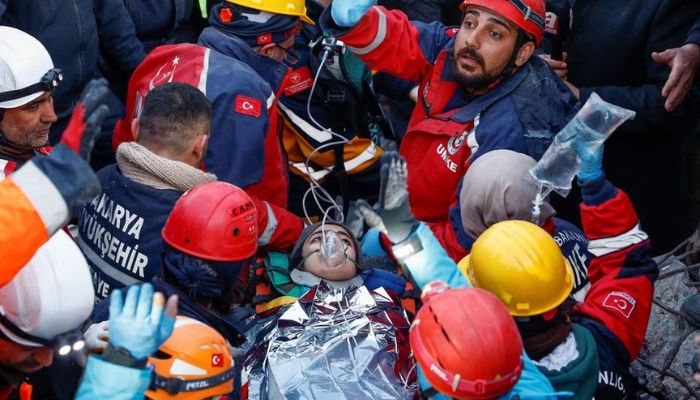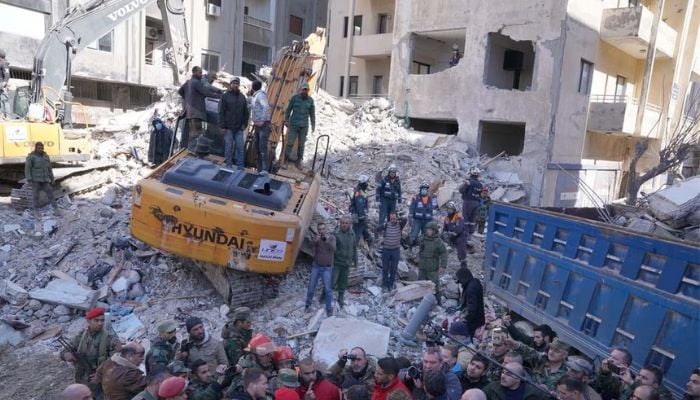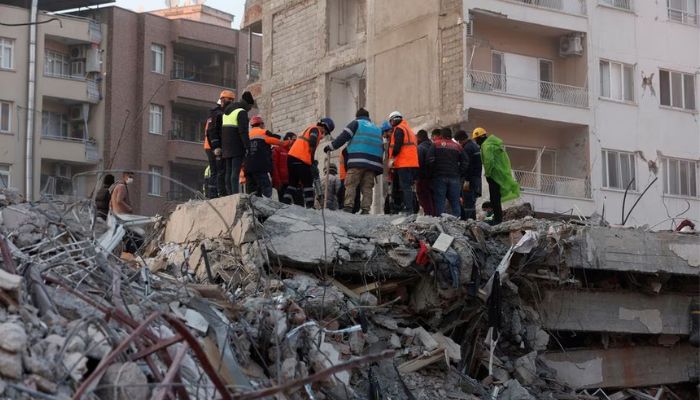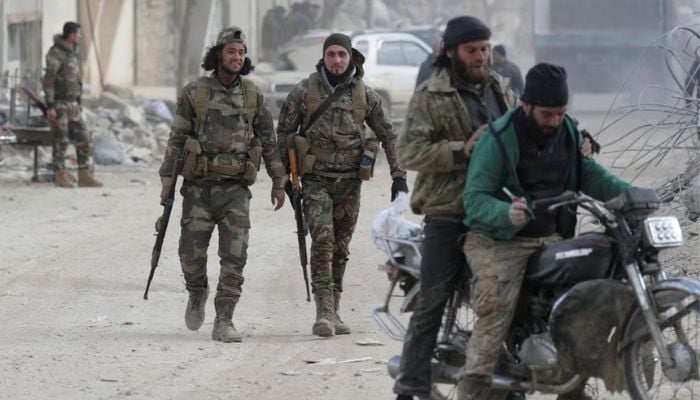[ad_1]

- Death toll 22,327 in Turkey, more than 3,500 in Syria.
- Hundreds of thousands homeless in middle of winter.
- UN aid chief praises Turkey's quake response.
Exhausted rescuers pulled dwindling numbers of survivors from earthquake rubble in Turkey and Syria on Saturday five days after one of the region's worst natural disasters whose death toll neared 26,000 and looked set to rise far higher.
Some rescue operations were halted after reports of looting.
Facing questions over his handling of Turkey's most devastating earthquake since 1939, President Tayyip Erdogan promised to start rebuilding within weeks after he said hundreds of thousands of buildings were wrecked.
In Syria, the disaster hit hardest in the rebel-held northwest, leaving many homeless for a second time after already being displaced by the ongoing civil war.

In the southern Turkish city of Antakya, body bags lay on streets and residents wore masks against the smell of death as they joined rescuers who had still to reach some buildings.
“There is chaos, rubble and bodies everywhere,” said one, whose group had worked overnight trying to reach a university teacher calling to them from the rubble.
By morning, she had stopped responding.
In Kahramanmaras, close to the epicentre in Turkey, there were fewer visible rescue operations amid the smashed concrete mounds of fallen houses and apartment blocks.
But at one building, rescuers burrowed between concrete slabs to reach a five-year-old girl still alive, lifting her on a stretcher, wrapped in foil, and chanting “God is Greatest”.

Only several others were brought out alive on Saturday.
Two German rescue organisations suspended work, citing reports of clashes between groups of people and gunfire.
An Austrian team also briefly suspended work.
‘Looters with knives'
Gizem, a rescue worker from the southeastern province of Sanliurfa, said she had seen looters in Antakya. “We cannot intervene much as most of the looters carry knives,” she said.
Police and soldiers were out in force on Saturday to keep order, also helping with traffic, rescues and food handouts.

Turkey said about 80,000 people were in hospital, with more than 1 million in temporary shelters.
Outside Antakya, workers at a mass grave lowered bodybags into a freshly dug trench where a mechanical digger covered them with earth. About 80 bags awaited burial.
New graves also covered a hillside outside Gaziantep, some marked with flowers or small Turkish flags flapping in the breeze. A woman broke down in sobs next to one of the graves as a boy tried to comfort her.
Survivors feared disease, with basic infrastructure smashed.
“If people don't die here under the rubble, they'll die from injuries, if not they will die from infection. There is no toilet here. It is a big problem,” rescue worker Gizem said.
UN aid chief Martin Griffiths described the earthquake as the worst event in 100 years in the region. He praised Turkey's response, saying it was his experience that people in disaster zones were always disappointed early in relief efforts.
He predicted the death toll would at least double.
The disaster hit as Erdogan prepares for a national election scheduled for June. His popularity was already falling amid the soaring cost of living and a slumping Turkish currency.
Even before the quake, the vote was seen as Erdogan's toughest challenge in two decades in power. Since the disaster he has called for solidarity and condemned “negative” politicking.
People in the quake zone and opposition politicians have accused the government of slow and inadequate relief early on and critics have said the army, which played a main role after a 1999 earthquake, was not involved fast enough.
Erdogan has acknowledged some problems, notably getting aid into a region where transport links were damaged, but said the situation was subsequently brought under control.
Questions are also starting to be asked about the soundness of buildings. State prosecutors in Adana ordered the detention of 62 people in an investigation into collapsed buildings, while prosecutors sought the arrest of 33 people in Diyarbakir for the same reason, state-owned Anadolu news agency reported.
One of century's worst disasters
Monday's 7.8 magnitude quake, with several powerful aftershocks across Turkey and Syria, ranks as the world's seventh deadliest natural disaster this century, approaching the 31,000 killed by a quake in neighbouring Iran in 2003.
With a death toll so far of 22,327 inside Turkey, it is the country's deadliest earthquake since 1939. More than 3,500 have died in Syria, where tolls have not been updated since Friday.
In the opposition-held northwest, it was a horrible deja vu for many after being uprooted once by war.
“On the first day we slept in the streets. The second day we slept in our cars. Then we slept in other people's homes,” said Ramadan Sleiman, 28, whose family had fled eastern Syria to the town of Jandaris, which was badly damaged in the quake.
In the government-controlled Syrian city of Aleppo, World Health Organisation chief Tedros Adhanom Ghebreyesus described the disaster as heartbreaking as he supervised some relief distribution and promised more.
A shipment of Italian aid destined for government-held parts of Syria landed in Beirut, Italy's envoy to Damascus said, in the first European earthquake assistance to the government.
Western nations have largely shunned President Bashar al-Assad during the war that began in 2011.
The northwest has received little aid, compared to the dozens of planeloads that have arrived in areas held by the Syrian government – many of them from Arab countries, Russia, Iran, India and Bangladesh, according to Syrian state media.
[ad_2]
Source link


